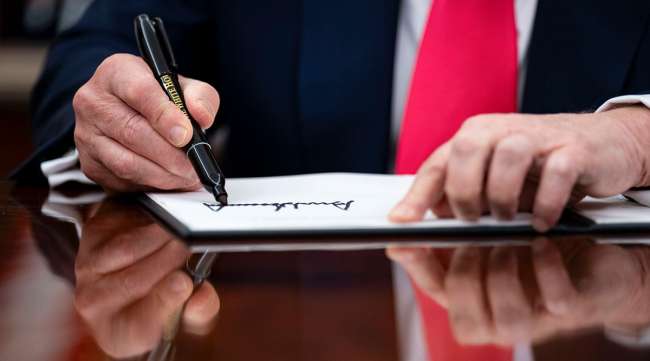President Donald Trump signing an executive order. (Al Drago/Bloomberg News)
President Donald Trump signed a directive April 15 aimed at bolstering the use of technology in the permitting process for infrastructure developments, part of a broader administration effort to cut red tape and speed the approval of new projects.
The memorandum directs executive departments and agencies to make “maximum use of technology in environmental review and permitting processes for infrastructure projects of all kinds, such as roads, bridges, mines, factories, power plants and others.”
It seeks to eliminate the use of paper-based applications and review processes, reduce the need for duplicative data submissions and make it easier for agencies to work together to speed up approval of projects — including by using analyses from different parts of the government — and by increasing the transparency and predictability of permit schedules.

Trump
The directive calls on the chairman of the Council on Environmental Quality, after consulting with the National Energy Dominance Council and other relevant agencies, to issue a Permitting Technology Action Plan for modernizing the technology used for federal permitting and environmental reviews. And it directs the CEQ chairman to establish and lead an interagency Permitting Innovation Center that will design and test prototypes to boost the effort to harness technology.
Trump has vowed to help expedite permitting for companies willing to invest in the U.S., seizing on long-standing bipartisan complaints over the lengthy wait times for proposed projects looking to clear environmental reviews and secure federal authorizations.
RELATED: Port Leaders Seek Reprieve From Permitting Snarls
The president has vowed to bolster domestic manufacturing and energy production, including through the use of tariffs on trading partners and key sectors of the economy in a bid to convince companies to bring more investment and jobs to the U.S.
Trump has regularly cited specific investment pledges by prominent companies, hailing the projects and vowing to help accelerate their completion.
Earlier April 15, Trump pointed to plans by Nvidia Corp., the dominant player in chips for artificial intelligence, to produce $500 billion worth of AI infrastructure in the U.S. and pledged, in a post to his Truth Social network, that “All necessary permits will be expedited and quickly delivered.”






